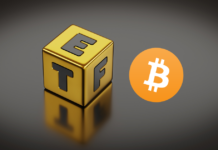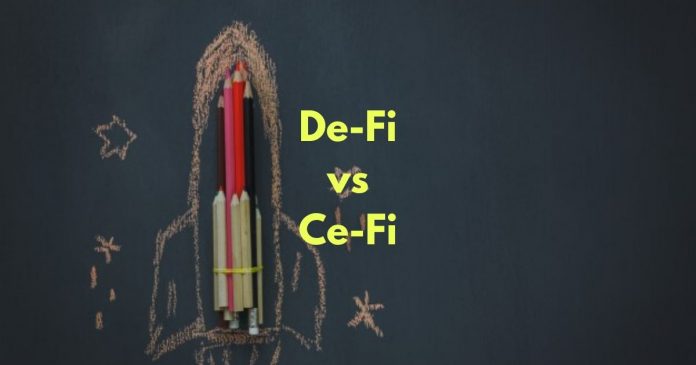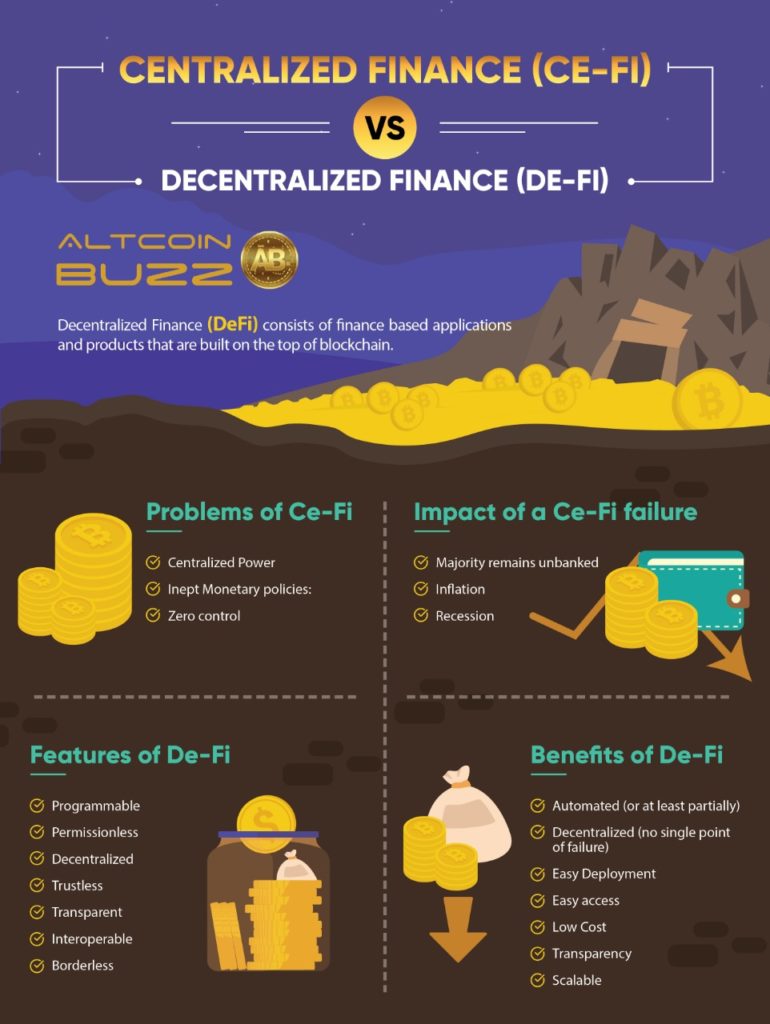The banking system has been prevalent for centuries with established models. Said models have not changed for a long time. People have become comfortable with the system. They have become a part of the system. The standard SOPs have been engraved in the minds of a regular customer.
Now, all of a sudden, we have a new kid on the block, Decentralized Finance (DeFi). Why should you care about it? Why is it important? How will it benefit you? In this article, we answer these questions.
Traditional finance
The first picture we have when we think about traditional financial systems is banks. The banks act as a trusted third-party taking care of our financial requirements. We trust them. They have upgraded themselves to digital and become more user-friendly. However, deep inside, the inherent problems remain unresolved.
The Great Depression in 1929 was caused after a major fall in stock prices in the United States.
The financial crisis of 2007–2008 began with a depreciation in the subprime mortgage market. Investment bank Lehman Brothers collapsed.
Loss of jobs. People thrown into poverty. Families destroyed.
Let us take an example. Do you gain from the interest in your savings account? Consider the following example. Central authorities/banks can print money at will. Look at what they did during the coronavirus crisis, famously tagged as the “Brrrr!” This has a direct impact on inflation.
Source: Economicshelp
You see, you are losing your hard-earned money. Nobody tells you that!
Drawbacks of the traditional financial system
- Centralized power: A central authority manages and regulates the demand and supply of the currencies. There is no proper governance or voting mechanism to come to a consensus and make a decision. Quick decisions resolve short-term goals but create long-term problems.
- Inept monetary policies: Monetary policies are often politically motivated and non-standardized. They change with a change in geopolitical scenarios, as well as a change in governments. This causes delays in progress.
- Zero control: A centralized bank can freeze your account at any time. Central banks and the government govern interest rates, refund policies, etc. We have zero control over how our money is used by the banks. We do not get a share of the bank’s profits through investments.
Can DeFi solve such problems? Let’s explore.
Definition of DeFi
DeFi ecosystems are open source and consist of protocols, digital assets, dApps, and smart contracts. All of these are built on the blockchain. There is no point of failure. Multiple computers store immutable records through peer-to-peer networks. It is transparent, auditable, and can be reviewed by everyone.
DeFi is easy to access. It has fewer procedures. It is also interoperable across blockchains. A Defi dApp can be any financial tool – a loan system, an insurance app, a betting tool. Many of these apps are simple plug-and-plays and can be combined, modified, and integrated.
Advantages of DeFi over CeFi
- DeFi is decentralized (or at least partially): DeFi is a web of smart contracts. They work in tandem to perform a particular financial activity. There is no central institution. Codes run the show. The code takes decisions and also resolves disputes. The users have complete control over their funds.
- DeFi has no single point of failure: Banks can fail! In blockchain, each node maintains a copy of the ledger. The more nodes, the more difficult it is to hack the network.
- Easy deployment: DeFi dApps act as modules and can easily be replicated and deployed as when needed.
- Access to the unbanked: The ease of access to DeFi apps makes it available to the remotest locations. All you need is the internet and a mobile phone.
- Low cost: DeFi has low cost due to low overheads. It is a more frictionless financial system.
- Transparency: Open source code is auditable. Traditional financial policies might not be. This makes De-Fi more transparent.
- Scale: A DeFi network can comprise of a network of dApps having multiple functions, covering multiple geographies. Projects can combine and create bigger projects.
Challenges Associated with DeFi
- Security: Projects are still susceptible to hacks. Users need to keep their keys safely and storing big keyphrases is a challenge. Many DeFi projects are not fully decentralized and, hence, have more points of failure.
- Standards: Lack of standards has created low build qualities. There have been too many projects failing. Even MakerDao faced liquidation issues during the Black Swan event.
- Analytics: As the sector is new, the data samples and population are small. Hence, proper benchmarks are not available.
- Regulations: Many geographies need regulation. Else, this creates an uncertain situation about the way a DeFi network runs.
- Fragmented Market: There are lots of projects working independently. There are overlaps and there are gaps. This creates a fragmented market.
The Future of DeFi
Many blockchain-based finance products are still centralized. Automated smart contracts comprise a percentage of the architecture. The use of the word DeFi is still very vague. Pure decentralization is still a holy grail, though many projects are tending towards it. Even though many DeFi Projects like MakerDao and Compound have been a huge success, there is a scope of improvement in multiple areas. The mechanism of collateralization needs to be further perfected. Governance is still a problem and there is minimum participation in votes. New segments like insurance are coming in. The introduction of interoperability protocols like Ren enables cross-chain applications of DeFi. In the future, crypto wallets will play a bigger role. They will act as dashboards and aggregators. They will become more user-friendly. There is a huge opportunity, and the future is bright.
Subscribe to Altcoin Buzz for our future articles regarding DeFi.
References: Appinventiv, Binance Academy, Cointelegraph
Previous Read: Decentralized Finance (DeFi) – A Complete Overview
Disclaimer
The information discussed by Altcoin Buzz is not financial advice. This is for educational and informational purposes only. Any information or strategies are thoughts and opinions relevant to accepted levels of risk tolerance of the writer/reviewers and their risk tolerance may be different than yours. We are not responsible for any losses that you may incur as a result of any investments directly or indirectly related to the information provided.
Do your due diligence and rating before making any investments and consult your financial advisor. The researched information presented we believe to be correct and accurate however there is no guarantee or warranty as to the accuracy, timeliness, completeness. Bitcoin and other cryptocurrencies are high-risk investments so please do your due diligence. Copyright Altcoin Buzz Pte Ltd. All rights reserved.





























